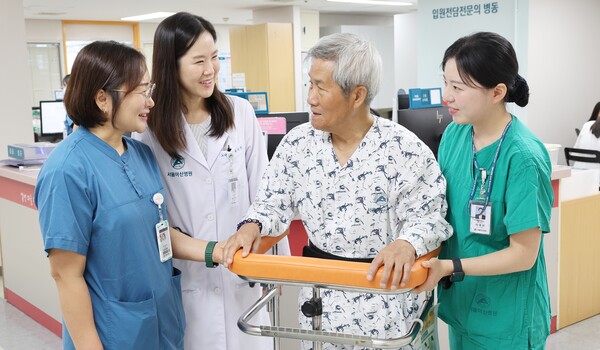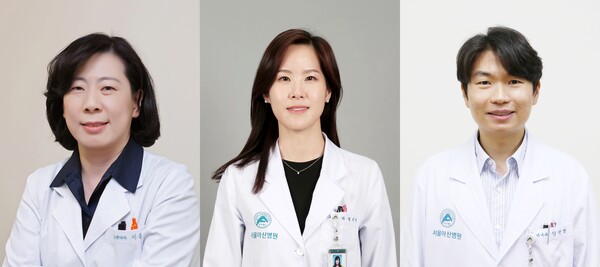Elderly patients are prone to various risks after hospitalization, such as delirium, falls, and complications. A method developed by Korean medical professionals, capable of identifying these risks with 80 percent accuracy on the first day of admission, is drawing significant attention.

Asan Medical Center announced on Monday that a research team led by Professors Lee Eun-ju and Baek Ji-yeon of the Department of Geriatric Medicine, together with specialist Jang Geon-young, has developed the “Acute Care for Elders Risk Score” for the first time in Korea. This score quantitatively assesses the risk potential commonly faced by patients aged 65 and older on the first day of hospitalization.
As about 40 percent of Asan Medical Center's inpatients are 65 or older, with many critically ill, the hospital has pioneered the adoption of the Clinical Frailty Scale to screen high-risk elderly patients early.
However, this scale primarily focused on assessing mobility, without fully utilizing the diverse clinical data available. It also carried the risk of evaluator bias, limiting its predictive power. To address these limitations, the research team developed a new assessment tool that integrates the existing Clinical Frailty Scale with additional clinical data to accurately predict major risks for elderly patients, including delirium, falls, bedsores, and in-hospital mortality.
Between May 2021 and November 2023, the team analyzed medical data from 21,757 elderly patients aged 65 and older who were admitted to Asan Medical Center, using machine learning techniques. They reviewed 18 variables captured from the electronic medical record (EMR) system on the first day of hospitalization.
This analysis identified five key indicators as the strongest predictors: the Clinical Frailty Scale, serum albumin level (nutrition/immunity), CRP level (inflammatory response), hemoglobin (anemia status), and the number of pre-admission medications. Based on these findings, the team developed the Acute Care for Elders Risk Score and compared its predictive performance with that of existing assessment tools, such as the Clinical Frailty Scale and age.
The results showed that the newly developed score demonstrated excellent predictive performance, achieving 83.7 percent accuracy in predicting risk factors for elderly patients. In comparison, the existing Clinical Frailty Scale achieved 79.8 percent accuracy, while age-based prediction reached only 63 percent.
The Acute Care for Elders Risk Score also subdivides risk levels within patient groups sharing the same Clinical Frailty Scale score. In other words, it precisely identifies which patients among those classified as “frail” are exposed to greater risk.
Furthermore, higher scores were associated with increased rates of adverse events within 30 days post-discharge, including readmission, emergency department revisits, prolonged hospitalization, and activation of the rapid response team.

“It is difficult to identify high-risk elderly patients based solely on disease and age. The Acute Care for Elders Risk Score helps by subdividing the potential risks that can occur in elderly patients, allowing for a more precise assessment. Medical staff can quickly identify patients requiring intensive care and provide appropriate treatment,” Professor Lee said.
Professor Baek added, “The Acute Care for Elders Risk Score is a useful tool that can be immediately applied in clinical settings without complex tests or equipment. We hope this scale becomes a new standard for treating elderly patients in Korea, enabling them to receive safe treatment and recover without complications.”

